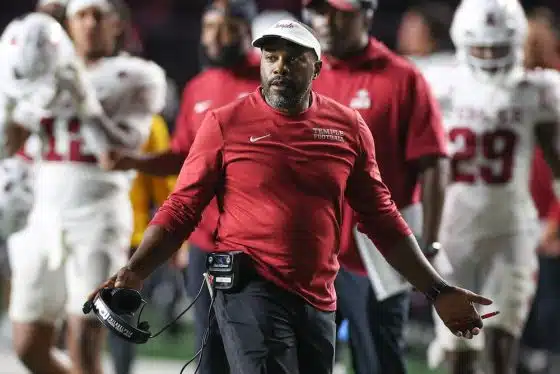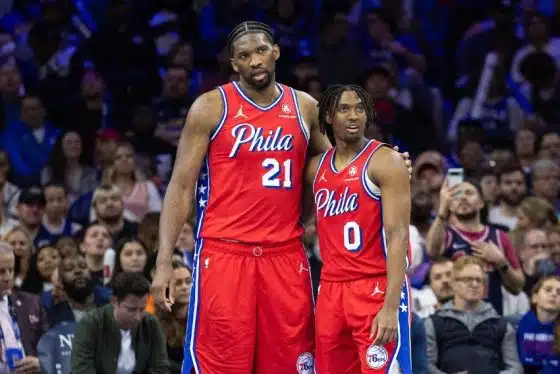Uncategorized
Too much Chip: Lurie Failed to Learn from Past Power Struggles
Amid rampant speculation that Chip Kelly wanted to leave the Eagles, Jeffrey Lurie gave him the keys to the franchise. Kelly will not only be the head coach and chief play caller, but he will also be the head of player personnel, charged with overseeing scouting, free agency, and the draft.
Lurie said that Kelly did not make any demands; that it was a mutual decision among the top Eagles executives after a week long process of evaluating where the Eagles stood. With all due respect to Lurie, I am not buying it. We can read the tea leaves and draw the reasonable conclusion that a conflict emerged between Chip and Roseman, and when push came to shove, Lurie chose Chip.
They say that those that are ignorant to history are doomed to repeat it. After the 2000 season, a young Andy Reid had turned around a vagabond Eagles team, going 11-5 after having gone 5-11 the year before. The team capped the turnaround with a playoff victory and seemed on the verge of building something special. Then Washington Redskins head coach Marty Schottenheimer went so far as to state that the Eagles were the best team in the NFC East.
Long time NFL executive Tom Modrak was the director of football operations and received considerable credit for helping to turn the Eagles into legitimate Super Bowl contenders. But a power struggle erupted within the Eagles organization, with Andy Reid wanting more control over player personnel.
Lurie acquiesced, fired Modrak after the 2001 season, and named Reid the executive vice president of football operations. The new fancy title gave Reid power over the player personnel to go along with his role as head coach and chief player caller.
Reid enjoyed sporadic success. The 2002 draft rivals the 2012 draft for impact players: Lito Sheppard, Michael Lewis, Sheldon Brown and Brian Westbrook were significant contributors to the Eagles run through the mid-2000s. The 2005 draft was also good, producing three starters in Mike Patterson, Trent Cole and Todd Herremans. The Eagles made 3 NFC championship games and the Super Bowl by 2005 in part due to the acquisitions Reid made early in his tenure.
But it eventually became too much. Saddled by his other responsibilities, Reid turned play calling over to Marty Mornhinweg. Ask any Eagles fans how that one worked out.
To make matters worse, his drafts produced less and less impact players. People focus on the 2010 and 2011 drafts as examples of Reid's bad drafting, and indeed, they were historically bad. But people also forget how bad the Eagles drafts were from 2003 until 2008.
I used to think Reid did fine until I went back and looked over that list. It was shocking how many players he swung on and missed. LJ Smith, Shawn Andrews, Mike Patterson, Broderick Bunkley, Todd Herramens, Trent Cole, Brent Celek and Jason Avant were the highlights of those drafts.
But they also included Jerome McDougle, Billy McMullen, Jamaal Green, Matt Ware, J.R. Reed, Trey Darilek, Thomas Tapeh, Andy Hall, Winston Justice (the guy who gave up 8 sacks to the Giants in a single game), Chris Gocong, Max Jean-Gilles, Kevin Kolb, Stewart Bradley, and Victor Abiamari. That is a who's who list of disappointments and let downs.
And while 2008 and 2009 produced DeSean Jackson, LeSean McCoy, and Jeremy Maclin — who were without a doubt great picks — they accounted for just 3 of 18 total picks from those two drafts combined. Not exactly a high draft average, folks.
Listen to Reid and Roseman talk now about the 2011 offseason, and you hear them discuss how they were reaching to fill the holes in the roster because they thought they were so close to getting over the hump. It lead to the infamous "Dream Team" offseason, where big money was thrown around to free agent busts like Nnamdi Asomugha, Vince Young and Ronnie Brown. But had the Eagles not swung and miss so often in the draft the prior 8 years, those signings arguably would not have been necessary.
This is not to say Reid was a failure. He is arguably the greatest coaches in franchise history. But recognizing his strengths and failures are not mutually exclusive propositions. He struggled in his role as the head of player personnel, and it ultimately had a significant impact on the Eagles inability to win the Super Bowl. Reid tacitly admitted it was too much responsibility when he signed on with the Chiefs and brought longtime confidant and friend John Dorsey to be the GM and head of player personnel.
It says here that the current situation is even more concerning. Lurie never gave Reid complete control over player personnel like he has Chip Kelly. So it is fair to wonder whether Chip Kelly might be in over his head.
Consider the following:
1. Of the 32 teams in the NFL, only two, the New England Patriots and Seattle Seahawks, vest so much control in a single individual. Bill Bellichick serves the role as GM and head coach. Pete Carroll's role is more akin to that of Andy Reid. He was given the ability to hire a GM, and works in tandem with John Schneider on player evaluation. But both men have won Super Bowls. Chip Kelly is a great coach. But he has not won a playoff game yet.
2. We know from Lurie that the 2012 draft was the byproduct of Roseman. And that draft is clearly one of the best drafts we have ever had in franchise history: Cox, Kendricks, Curry, Foles and Boykin are all building blocks for a championship caliber team.
3. Almost immediately upon his arrival, Kelly started to chip away at Roseman's control over player acquisition. In the 2013 draft, Kelly stated that if Dion Jordan was available at 4, the Eagles would have taken him over Lane Johnson. By all accounts, Jordan has been a bust, having 46 tackles and 3 sacks in two years. To make matters worse, he missed 6 games this year for violating the leagues substance abuse policy. Johnson, on the other hand, while not perfect (he also was suspended 4 games this year), has the makings of being a great offensive lineman.
4. Kelly was the person behind cutting DeSean Jackson and extending Riley Cooper. While I have defended Kelly's decision to cut Jackson, I can understand the criticism. The decision to extend Cooper, on the other hand, is questionable at best.
5. The 2014 draft was apparently the result of Kelly and Gamble, with two of the first five players coming from Oregon. And outside of Jordan Matthews, it has not yielded a good return on investment (while admittedly being too early to draw any concrete conclusions).
6. Roseman had to talk Chip Kelly out of taking former Oregon defensive end Taylor Hart in the third round. The Eagles selected Hart in the fifth round, based on intelligence Roseman had gathered from speaking to executives around the league. Hart was the only player on the Eagles 53 man roster that was not active for a single game this season.
7. Roseman also reportedly had to talk Chip Kelly out of drafting Jordan Matthews in the first round, because he knew that Matthews would be available in the second. While we can obviously critique who the Eagles selected in the first round instead, it is fair to wonder whether the Eagles will be hurt by Kelly's lack of understanding of a player's value come draft day.
Now, a couple caveats are needed before I get accused of being a “Kelly hater” and/or a “Roseman fan-boy”: this is not to say Roseman was the answer — indeed, the long list of executives shown the door because they butted heads with Roseman suggests he was as big a part of the problem as anyone.
Further, as with Reid, I am a big fan of Chip Kelly. From top to bottom, he has implemented a great system, as evidenced by the almost unanimous player buy-in. His players and other executives around the league have suggested he is an offensive genius. Perhaps that is premature, perhaps it is not. But this is and never will be about his ability as a head coach. With consecutive 10 win seasons, he has proven he has the wherewithal to coach in this league.
This is about giving too much power to one person. Being a head coach in the NFL is hard enough. Add play calling duties to the plate and you are pushing the envelope. Now asking that same individual to oversee scouting, free agency and the NFL draft, and you have a recipe for disaster.
Lurie knows this. Or he should have, based on his past experience with Reid.












































